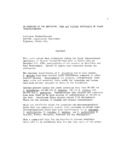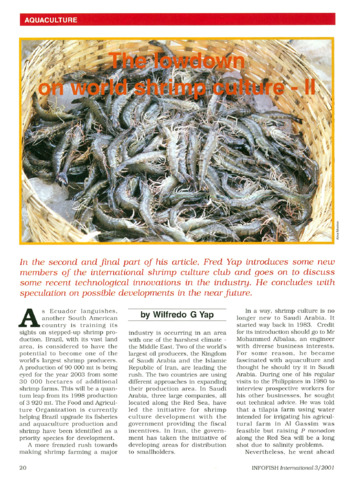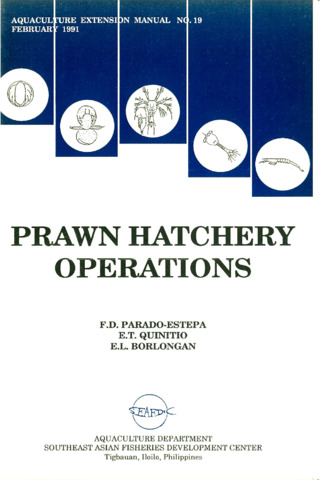Improved resistance against White Spot Virus (WSV) infection in tiger shrimp, Penaeus monodon by combined supplementation of peptidoglycan and mannan oligosaccharide (MOS)
Share
| dc.contributor.author | Apines-Amar, Mary Jane S. | |
| dc.contributor.author | Andrino, Karen Grace S. | |
| dc.contributor.author | Amar, Edgar C. | |
| dc.contributor.author | Cadiz, Rowena E. | |
| dc.contributor.author | Corre, Valeriano L., Jr. | |
| dc.date.accessioned | 2015-05-21T06:27:38Z | |
| dc.date.available | 2015-05-21T06:27:38Z | |
| dc.date.issued | 2014 | |
| dc.identifier.citation | Apines-Amar, M. J. S., Andrino, K. G. S., Amar, E. C., Cadiz, R. E., & Corre Jr., V. L. (2014). Improved resistance against White Spot Virus (WSV) infection in tiger shrimp, Penaeus monodon by combined supplementation of peptidoglycan and mannan oligosaccharide (MOS). Extreme Life, Biospeology and Astrobiology, 6(1), 1-9. | en |
| dc.identifier.issn | 2066-7671 | |
| dc.identifier.uri | http://hdl.handle.net/10862/2239 | |
| dc.description.abstract | An eight-week feeding trial was conducted to evaluate the effects of combined supplementation of peptidoglycan and mannan oligosaccharide (MOS) in tiger shrimp, Penaeus monodon. Tiger shrimp (0.29 ± 0.02 g) were fed diets supplemented with different levels of peptidoglycan + (MOS) as immunostimulants for six (6) and eight (8) weeks. Four (4) experimental diets were formulated to contain 0, 0.1, 0.2, and 0.4% peptidoglycan + MOS. The feeding trial was conducted in 250 L capacity concrete circular tanks (replicated four (4) times) with 20 shrimp per tank. Growth, survival, respiratory burst activity, total hemocyte count (THC), and in vivo resistance to WSV infection were evaluated. Weight gain of the shrimp was significantly higher in the immunostimulant-fed groups compared to the control. However, different levels of the immunostimulants did not differ in their effect on the the growth of the shrimp. On the other hand, respiratory burst activity and total haemocyte count (THC) were significantly higher in the group supplemented with 0.2% peptidoglycan + MOS than the rest of the treatments. Likewise, survival after infection with White Spot Virus (WSV) was significantly increased in the 0.2% peptidoglycan + MOS compared to the other groups. The present results demonstrated that using peptidoglycan and MOS together at 0.2% of the diet improves growth, activates immune responses such as respiratory burst activity and THC in P. monodon and give better protection to the shrimp against WSV infection. | en |
| dc.description.sponsorship | This study was fully supported by the Department of Science and Technology (DOST) through the Philippine Council for Agriculture, Aquatic and Natural Resources Research and Development (PCAARRD). Likewise, SEAFDEC AQD and Chemoforma Ltd. are gratefully acknowledged for the use of research facilities, and for supplying the immunostimulant, respectively. | en |
| dc.language.iso | en | en |
| dc.publisher | Bioflux Society | en |
| dc.relation.uri | http://www.elba.bioflux.com.ro/docs/2014.1-9.pdf | |
| dc.subject | Penaeus japonicus | en |
| dc.subject | immunostimulants | en |
| dc.subject | experimentation | en |
| dc.subject | Penaeus monodon | en |
| dc.subject | oligosaccharides | en |
| dc.subject | prawns and shrimps | en |
| dc.subject | Peptidoglycans | |
| dc.title | Improved resistance against White Spot Virus (WSV) infection in tiger shrimp, Penaeus monodon by combined supplementation of peptidoglycan and mannan oligosaccharide (MOS) | en |
| dc.type | Article | en |
| dc.citation.volume | 6 | |
| dc.citation.issue | 1 | |
| dc.citation.spage | 1 | |
| dc.citation.epage | 9 | |
| dc.citation.journalTitle | Extreme Life, Biospeology and Astrobiology | en |
| dc.subject.asfa | White spot syndrome virus | en |
| dc.subject.asfa | feeding | en |
| dc.identifier.essn | 2067-6360 | |
| dc.subject.scientificName | Penaeus monodon | en |
Files in this item
| Files | Size | Format | View |
|---|
This item appears in the following Collection(s)
-
AQD Journal Articles [1215]
These papers were contributed by AQD staff to various national and international journals



